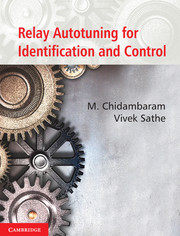Book contents
- Frontmatter
- Contents
- List of Figures
- List of Tables
- Acknowledgements
- Preface
- 1 Introduction
- 2 Improved Autotune Identification Methods
- 3 Cascade Controllers Tuning by Relay Autotune Method
- 4 Simultaneous Relay Autotuning of Cascade Controllers
- 5 A Simple Method of Tuning Cascade Controllers
- 6 Improved Saturation Relay Test for Systems with Large Dead Time
- 7 Identification of FOPTD Model using Single Symmetrical Relay Test
- 8 Autotuning of PID Controllers for Unstable FOPTD Systems
- 9 Autotuning of PID Controllers for Critically Damped SOPTD Systems
- 10 Estimation of SOPTD Transfer Function Model
- 11 Estimation of Five Parameters of Unstable SOPTD Model with a Zero
- 12 Identification of FOPTD Multivariable Systems
- 13 Identification of SOPTD Multivariable Systems
- 14 Tuning of Multivariable Controllers for Non-Minimum Phase Systems
- 15 Tuning of Multivariable Controllers by Genetic Algorithms
- 16 Summary and Conclusions
- Appendix A
- Appendix B
- Appendix C
- Nomenclature
- Problems
- Suggestive Reading
- References
- Index
14 - Tuning of Multivariable Controllers for Non-Minimum Phase Systems
Published online by Cambridge University Press: 05 June 2014
- Frontmatter
- Contents
- List of Figures
- List of Tables
- Acknowledgements
- Preface
- 1 Introduction
- 2 Improved Autotune Identification Methods
- 3 Cascade Controllers Tuning by Relay Autotune Method
- 4 Simultaneous Relay Autotuning of Cascade Controllers
- 5 A Simple Method of Tuning Cascade Controllers
- 6 Improved Saturation Relay Test for Systems with Large Dead Time
- 7 Identification of FOPTD Model using Single Symmetrical Relay Test
- 8 Autotuning of PID Controllers for Unstable FOPTD Systems
- 9 Autotuning of PID Controllers for Critically Damped SOPTD Systems
- 10 Estimation of SOPTD Transfer Function Model
- 11 Estimation of Five Parameters of Unstable SOPTD Model with a Zero
- 12 Identification of FOPTD Multivariable Systems
- 13 Identification of SOPTD Multivariable Systems
- 14 Tuning of Multivariable Controllers for Non-Minimum Phase Systems
- 15 Tuning of Multivariable Controllers by Genetic Algorithms
- 16 Summary and Conclusions
- Appendix A
- Appendix B
- Appendix C
- Nomenclature
- Problems
- Suggestive Reading
- References
- Index
Summary
The system with one or more right half plane transmission (RHPT) zero is generally called as a non-minimum phase system. In this chapter, two methods of designing multivariable controllers for the systems with RHPT zeros are compared (Reddy et al., 2006). The methods used are decoupled internal model controller (IMC) (Wang et al., 2002) and a simple tuning method (Davison, 1976). In decoupled IMC method (Wang et al., 2002), controller design procedure is developed with the help of a model reduction theorem. Davison (1976) proposed a simple tuning method, which is based on the inverse of the steady-state gain matrix [G(0)]. Previously the method was applied to multivariable minimum phase systems only. In the present work, Davison method is applied to systems with multivariable right half plane zero. The decoupled IMC method (Wang et al., 2002) involves some complex calculations in designing the controllers whereas the Davison method (1976) is simple to apply. Simulation results are given for the following 2 × 2 transfer function matrix of the systems: (i) four-tank system, a benchmark example of multivariable system (Johansson, 2000) (ii) system (Morari et al., 1987) with individual and multivariable transmission zero at s = 1 (iii) binary distillation column (Wang et al., 2002). The performance comparisons are given by the sum of IAE values based on response and interaction both for servo and regulatory problems. The simple tuning method gives an improved performance.
- Type
- Chapter
- Information
- Relay Autotuning for Identification and Control , pp. 183 - 194Publisher: Cambridge University PressPrint publication year: 2014



